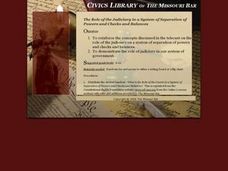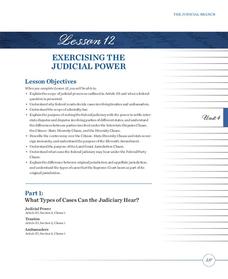Curated OER
What is Due Process Anyway?
Students examine the term due process and its historical origins. They compare and constrast the requirements of due process in the United States Constitution and the Indiana Constitution. They also discuss the difference between...
Curated OER
What's the Difference Between Procedural and Substantive Due Process?
Students discuss the difference between substantive and procedural due process. They research the uses of due process on the internet and books. They also discuss cases involving students and due process.
Curated OER
Government: Missouri Bar Civics Library
Learners visit the Missouri bar Website to examine information about the U.S. Constitution and its Amendments. They complete a variety of activities from the provided lessons including the judiciary, Fourth Amendment issues, civil law,...
Curated OER
Lawyers, Guns and Meaning
Students examine why they either do or do not have guns in their own household and how guns affect their sense of safety. They explore the controversy surrounding how best to interpret the Second Amendment by reading and discussing the...
Curated OER
Skits and John Adams' Administration
Students perform skits which have been prepared on the events of John Adams' administration, including: The Alien and Sedition Acts, The Judiciary Act of 1801 (The Case of the Midnight Judges), The XYZ Affair, and the Kentucky and...
Curated OER
Supreme Court Confirmation Process
Students examine the Supreme Court and the confirmation process. They simulate a confirmation hearing with students role-playing as nominees and others as members of the Judiciary Committee. Students compose short essays outlining the...
Curated OER
The Changing Meaning of "Due Process"
Students examine the United States Constitution and how the application for due process differs in two amendments. They research the changing definition of the term since the Civil War. They use the internet to research press coverage of...
Curated OER
Utah's Judicial Branch
Seventh graders explain that the judicial branch of Utah's government interprets laws and reviews the consitutionality of laws.
Curated OER
Oral Arguments Online
Middle schoolers participate in their own mock oral arguments. They create their own opinions and discuss any opposing opinions. They write their own opinion for a case to end the lesson.
Curated OER
Can I Have a Jury Trial?
Students examine the difference between a jury trial and a bench trial. They discuss any protections that the Indiana and United States Constitution offers its citizens. They use the internet to research any current press of jury trials.
Curated OER
Courts in the Classroom: Ritter v Stanton
Young scholars read the case briefs of Ritter v Stanton. They simulate the trial with classmates taking various parts such as appellant, appellee, bailiff, and justices. After conducting a mock argument, they write their own opinion for...
Curated OER
How Long is Too Long?
Students examine the legal term statute of limitations and how it varies based on the type of criminal or civil activity under discussion. They discern the applicable statute of limitations given an hypothetical or actual situation and...
Curated OER
Oral Arguments Online
High schoolers conduct a mock oral argument based on the briefs provided and further research as assigned by the instructor. They write an opinion for the case outlining why one legal argument prevailed over the other based on their own...
Curated OER
Indiana Courts: How Do They Work?
Students identify the branches of Indiana's judicial system and determine the differences between the different courts and different types of cases. Students create a flow chart showing how a court case works its way through the legal...
Curated OER
Ask Me What's Great About America
Learners pretend to be citizens of a new space colony and have been elected to the Intergalactic Senate to consider adding a Bill of Rights to the Constitution. They break into groups and discuss what seems unfair and fair about the...
Curated OER
Ira Ritter, Et Al., V. Jerry And Ruth Stanton Lesson 2: What Does a Jury Do Anyway?
Students investigate how a jury is chosen, and what the rights and responsibilities of juries are. They examine case studies to determine the role of the jury in both criminal and civil cases.
Curated OER
Kirit C. Shah, M.D. v. Stan Harris and Nancy Harris Lesson 1: One Case, Two Sides
Students examine how lawyers prepare their arguments. They realize that both sides of a legal case may use the same cases as precedents in their positions. They find decisions of the Indiana Supreme Court and the Indiana Court of Appeals...
Heritage Foundation
Courts and Judges
If the Supreme Court is so supreme, why do all cases not just start there? High schoolers learn why every case does not start at the Supreme Court as well as the importance of hierarchy in the US judicial system in the 11th installment...
Advocates for Human Rights
Mock Immigration Court
As part of a unit study of immigration, class members participate in a mock Immigration Court activity in which they argue four cases before an immigration judge.
Heritage Foundation
The House of Representatives
The House of Representatives has a lot of responsibility in the United States government. But how did it all begin, and why is it the way it is now? A comprehensive lesson answers all of these questions about the US Constitution and...
Heritage Foundation
Voting and the Constitution
How difficult was it for everyone to get voting rights? Understanding voting rights and the fight to get them for everyone in the United States can be tricky for some learners. However, they are clarified after engaging in the...
Curated OER
The Supreme Court: The Judicial Power of the United States
Students investigate some basic facts about the Supreme Court by examining the United States Constitution and one of the landmark cases decided by that court. The operation of the Supreme Court forms the focus of the lesson.
Heritage Foundation
Exercising Judicial Power
We should all do more exercising, but should the judicial branch as well? High schoolers develop their understanding of what powers the judicial branch carries because of the US Constitution, as well as where their limits lie in the...
Curated OER
Bill of Rights
US history classes explore constitutional rights as they relate to court cases involving teens. Your class must already be familiar with the Bill of Rights before beginning this series of exercises. In preparation for a debate-style...
Other popular searches
- Judiciary Branch
- Judiciary Act of 1789
- National Judiciary
- Judiciary Act of 1801
- Constitution Judiciary
- Federal Judiciary
- Judiciary Review
- The Judiciary
- The National Judiciary
- Government Judiciary Branch
- Congress and Judiciary
- The Federal Judiciary

























